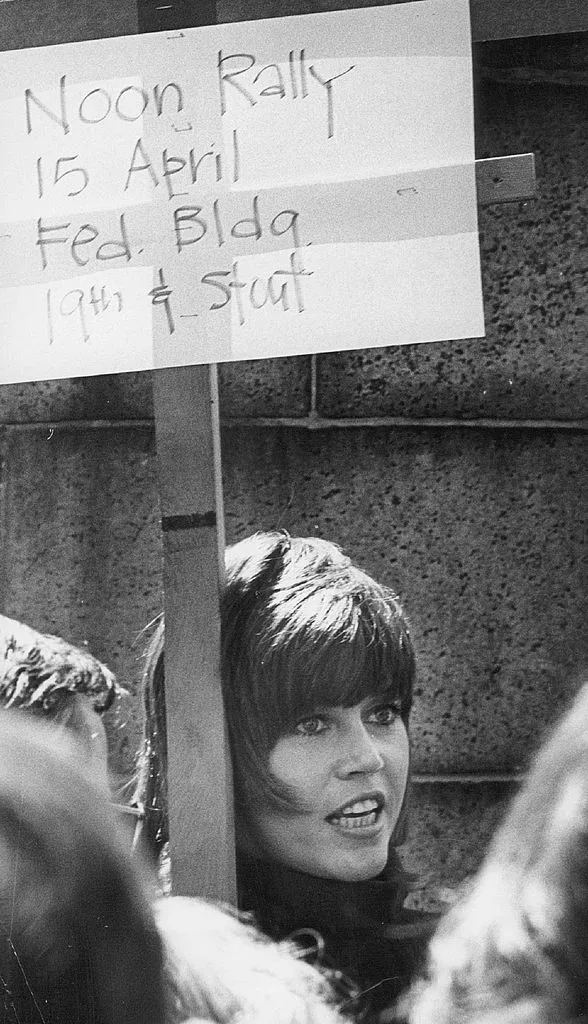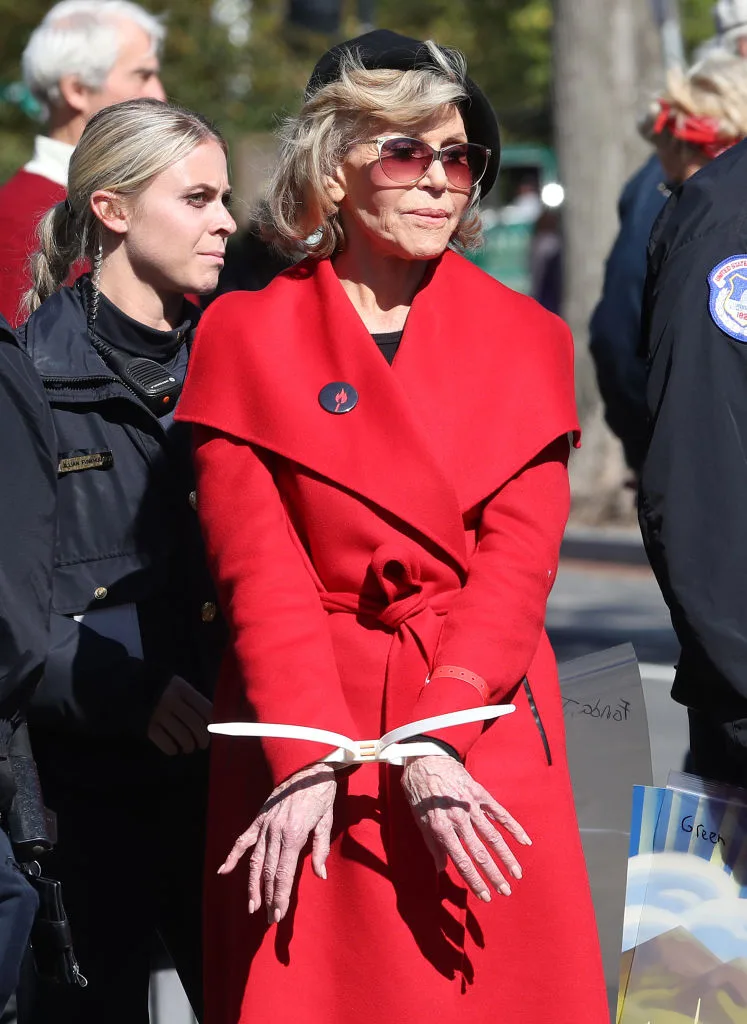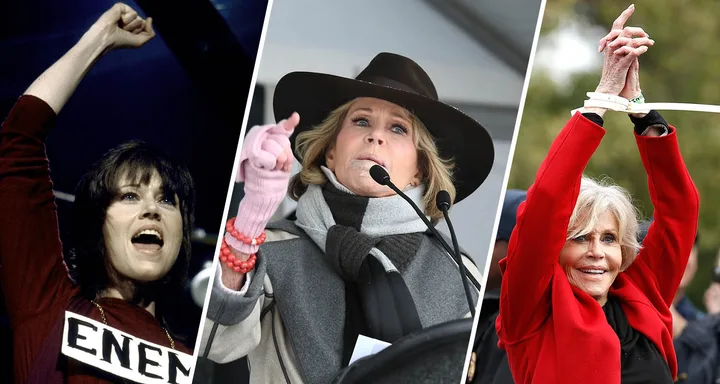In late 2019, photos of Jane Fonda being arrested and escorted away from the US Capitol building in Washington DC at a climate change protest went viral. But, the event was not a first for the Oscar-winning actress, who has long been a social, political, and environmental activist, earning her both praise and criticism.
In the wake of George Floyd’s death, Fonda is now advocating louder than ever. Speaking with CNN’s Don Lemon about white privilege, the 82-year-old actress revealed that she’s spent the last three years studying racism in the US. “I realise that I didn’t understand enough about the history of racism, about slavery and reconstruction, and Jim Crow,” she said, adding that the American policies need to change.
“Because we’re white, we have had privilege, even the poor of us have had privilege, and we need to recognise that and we have to understand what it is that keeps racism in place – the policies, redlining, banking policies, mortgage policies – all of the things that are making it really, really difficult for Black people to lift themselves up,” she said. “White people have to understand the history that has led to this, and we have to try to make changes in ourselves, and we have to get to know Black people and they have to become our friends, and we have to understand the reality that they live in and we have to do it now.”
Fonda’s dedication to activism began in the 60s and is still going strong with the introduction of her Fire Drill Fridays campaign inspired by climate activist Greta Thunberg. We take a look back at just some of her most meaningful and powerful activist moments.
Fonda Aligns Herself With The Black Panther Party
As her career began to take off, Fonda decided early on to use her platform to focus on social activism. She aligned herself with the Black Panther Party, an organisation that looked to protect African Americans from police brutality, and eventually evolved into a revolutionary movement that worked to change social and economic inequalities faced by the black community. In 1968, while pregnant, Fonda led civil rights protests with members of the party and personally contributed donations and solicited funds for the group.
She Stood With Native American Protestors
When activist Bernie Whitebear led a Native group to occupy Fort Lawton in Seattle in response to the declining state of reservations in 1970, Fonda showed up and helped him to bargain for their rights. She also showed solidarity when young Native Americans occupied Alcatraz in San Francisco from 1969 to 1971 by visiting the protestors.
In 2016, as thousands of people gathered for months to protest the building of the Dakota Access Pipeline at Standing Rock, Fonda spent her Thanksgiving alongside the protesters. In a piece for TIME, she spoke of how that protest was a reminder that activism takes place within the context of work that has come before: “It has been 45 years since the Occupation of Alcatraz. At Standing Rock, we are witnessing the flowering of the seeds that were planted there and, again, it is the youth who seem to be leading the way.”

Fonda And The Vietnam War
In 1972, Fonda toured North Vietnam to speak against US military policy in the country. Radio broadcasts had Fonda appealing directly to troops, asking them to consider the role they were playing. A recording of one of her messages played in the documentary, Introduction to the Enemy, and reveals she begged military pilots to seriously think about their orders.
She Founded The Fonda Family Foundation
In 1998, Fonda created The Fonda Family Foundation, focusing on human rights and social services. She’s donated millions to Emory University and created the Grady Teen Clinic at Atlanta’s Grady Hospital. She has also donated to Georgia Campaign for Adolescent Power and Control between her two foundations and personal funds. Additionally, Fonda has contributed to the Alzheimer’s Association, Barbara Davis Center for Childhood Diabetes, Elton John AIDS Foundation, Heifer International, Los Angeles LGBT Center, Oceana, Peace Over Violence, and V-Day.
The Actress Introduces Fire Drill Fridays
Inspired by 17-year-old climate activist Greta Thunberg, Fonda decided to move to Washington D.C. and refocus her efforts on the climate crisis. She partnered with Greenpeace to hold climate protests on the steps of the Capitol Hill building every Friday, and in October was arrested and charged with unlawfully demonstrating. She’s been arrested five times for civil disobedience during her climate protests, and even spent a night in jail. Although she’s taken her Fire Drill Friday protests virtual due to the coronavirus pandemic, she’s committed to fighting for environmental reform and a Green New Deal.
“I can no longer stand by and let our elected officials ignore–and even worse–empower the industries that are destroying our planet for profit. We cannot continue to stand for this,” she wrote on the Greenpeace website.

Fonda’s Feminist Efforts
The actress has long championed the rights of women. In 2000, the Academy award-winning star became an active supporter of V-Day and is a member of the V-Board, a group of women who provide vision, leadership, and wisdom to help guide and support the movement. At a 2001 benefit at Madison Square Garden, she performed the monologue I Was There In The Room.
In that same year, she established the Jane Fonda Centre for Adolescent Reproductive Health, which aims to prevent teen pregnancy.
In 2004, Fonda led a march through Ciudad Juárez, with activists Sally Field and Eve Ensler (the founder of V-Day) urging Mexico to provide sufficient resources to newly appointed officials in helping investigate the murders of hundreds of women in the city. She also served as a mentor for the first all-transgender cast of The Vagina Monologues.
In a 2018 interview with Brie Larson for People, Fonda stated, “One of the great things the women’s movement has done is to make us realise that (rape and abuse is) not our fault. We were violated and it’s not right.” She continued, “I’ve been raped, I’ve been sexually abused as a child and I’ve been fired because I wouldn’t sleep with my boss. I always thought it was my fault; that I didn’t do or say the right thing. I know young girls who’ve been raped and didn’t even know it was rape. They think, ‘It must have been because I said ‘no’ the wrong way.'”










